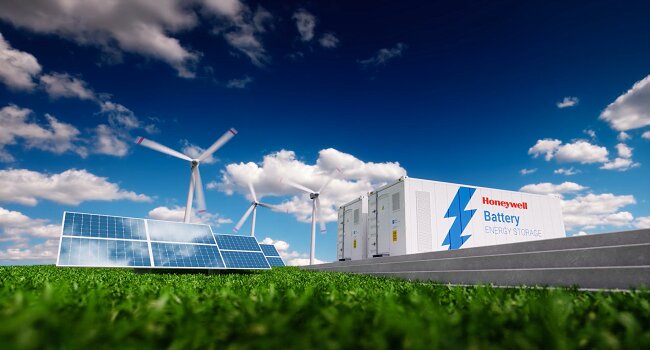Power Info Today conducted an interview with Ashish Gaikwad, the VP GM of Honeywell Industrial Automation India, discussing Honeywell’s innovative Battery Energy Storage Systems (BESS) and their impact on sustainable energy.
1. Can you provide an overview of how the battery energy storage system (BESS) contributes to the energy transition and the decarbonization efforts?
With the global commitment to Net Zero, nations worldwide are increasingly turning to renewable energy sources like solar and wind power, green hydrogen, etc. In this journey, battery energy storage systems (BESS) have emerged as critical enablers, addressing key challenges in the clean energy transition journey. One of the pressing challenges so far with renewable energy has been the intermittency between these energy sources and the grid pressure.
BESS is helping overcome these hurdles by storing excess energy produced during peak times and releasing it when demand is high or when renewable sources are unavailable. This ensures a more stable and reliable energy supply, ultimately supporting the integration of renewables into the energy grid. This makes renewable energy sources more dispatchable.i
Furthermore, BESS is contributing to grid stability by balancing supply and demand, thereby reducing reliance on fossil fuel-based backup power sources. This is not only helping reduce greenhouse gas emissions but also enhancing the overall efficiency and resilience of the energy system.
The ability of BESS to store and manage energy effectively is contributing significantly to the global agenda for decarbonization by enabling greater integration of renewables and reducing reliance on fossil fuels.
2. What are the key advantages of using BESS compared to traditional energy storage solutions in the context of decarbonization?
The significance of BESS has surged in recent years as it plays a pivotal role in accelerating the transition to a low-carbon energy future by offering various benefits over traditional energy storage solutions. Firstly, BESS provides unparalleled flexibility and agility in managing fluctuations in energy supply and demand. Unlike traditional storage solutions, BESS can rapidly respond to changes in energy production and consumption, thereby helping to stabilize the grid and ensure reliable electricity delivery.ii
Secondly, BESS has a better round-trip efficiency. It enables efficient utilization of renewable energy sources by storing excess energy and reducing the need for backup power from fossil fuel-based sources. Additionally, BESS facilitates the seamless integration of intermittent renewable energy sources into the grid, further supporting the transition away from fossil fuels.iii
Overall, the primary benefits of BESS over traditional energy storage solutions stem from their flexibility, efficiency, and capacity to facilitate the integration of renewable energy sources, thus making a substantial contribution to decarbonization efforts.
3. Could you elaborate on the features and capabilities of the Honeywell Ionic™ modular battery energy storage system?
Honeywell Ionic™ stands out as an advanced modular battery energy storage system (BESS) and energy management tool, designed to streamline the energy transition process for various stakeholders. This innovative solution offers flexibility in system sizing, enhanced energy density, and cost-efficiency, making it a versatile and indispensable component for customers navigating the transition to sustainable energy practices.iv
At its core, Honeywell Ionic™ is a compact and end-to-end solution, offering customers a seamless integration of BESS and energy management software capabilities within a single package. The system’s battery module is intelligently designed to accommodate cells from multiple battery suppliers, ensuring flexibility and futureproofing against evolving technological landscapes.
Another notable feature of Honeywell Ionic is its integration of liquid cooling technology, which plays a pivotal role in maintaining higher efficiency and better uniformity in cooling throughout charge and discharge cycles. By extending battery life through temperature equalization, this technology enhances the overall reliability and longevity of the system. Additionally, Honeywell Ionic incorporates a 1500 Volt DC battery stack that improves efficiency by reducing system losses.
4. How does Honeywell Ionic™ address the challenges of energy density and installation costs in battery energy storage?
Honeywell Ionic™ is poised to play a pivotal role in accelerating decarbonization efforts by providing efficient, reliable, and sustainable energy storage solutions.
The innovative design and modular architecture of Honeywell Ionic™ help solve the challenges of energy density, system sizing, and installation costs in battery energy storage. It maximizes space utilization and allows customers to meet energy storage needs effectively without requiring excessive physical space. Combined with industry-proven and trusted Honeywell controls, Honeywell Ionic™ provides greater flexibility in the deployment and optimization of available resources.v
The structural design and compact dimensions of Honeywell Ionic™, coupled with its modular architecture, enable simpler and more cost-effective installation processes. The modular approach allows for deployment with a standard forklift, eliminating the need for specialized equipment and reducing labor costs associated with site preparation. Moreover, the scalability of the system—from approximately 700 kWh to 300 MWh of energy capacity—ensures that customers can incrementally add storage capacity at their own pace, without overinvesting in excess capacity upfront. This lowers the initial investment required and minimizes the total cost of ownership over the system’s lifespan.
5. What are some notable case studies or success stories where Honeywell BESS has been deployed effectively for decarbonization purposes?
Last year, Honeywell partnered with VIElectron, a CB Loranger Company, in the U.S. Virgin Islands to deploy Honeywell’s Battery Energy Storage System to six strategically positioned solar parks across the islands. Upon completion, these solar arrays, coupled with the BESS, are projected to fulfill 30% of the islands’ energy consumption through renewable sources, significantly advancing their decarbonization efforts and bringing the U.S. Virgin Islands closer to achieving their 30% renewable energy consumption goal.
Furthermore, Honeywell has also collaborated with The Green Solutions Group Corporation (TGS) on Vietnam’s Tra Vinh Green Hydrogen project, the country’s first green hydrogen plant in the Mekong Delta. Through this partnership, Honeywell’s BESS will be employed at the Tra Vinh facility to enhance grid stability, reduce costs, and minimize carbon emissions from renewable power sources. By integrating renewable energy sources into the Tra Vinh facility, Honeywell’s BESS contributes to Vietnam’s overarching objective of achieving net-zero carbon emissions by 2050.vi
Honeywell’s BESS plays a critical role in increasing the usage of renewable energy from TGS’s solar farms by bridging gaps in sunlight availability and wind power oscillations. Through such successful deployments of Honeywell’s BESS technologies, we aim to support decarbonization efforts globally and advance the transition to a sustainable energy future. VIElectron is planned with a 40’ containerized BESS solution.vii
6. What are the current trends and future projections for the adoption of BESS in the context of global decarbonization initiatives?
The adoption of BESS is experiencing a remarkable surge, fueled by global decarbonization initiatives. Notably, India, alongside other countries like Barbados, Belize, Egypt, Ghana, Kenya, Malawi, Mauritania, Mozambique, Nigeria, and Togo, has joined the global BESS consortium, demonstrating a collective commitment to accelerate BESS deployment. This consortium, led by the Global Leadership Council of the Global Energy Alliance for People and Planet (GEAPP), aims to achieve a combined commitment of 5 GW of BESS by the end of 2024.viii This collaborative effort reflects the growing recognition of BESS’s importance in achieving decarbonization goals and enhancing energy resilience.iiiv
This notable trend towards the widespread deployment of BESS across various sectors and regions is driven by governments and organizations worldwide who are increasingly prioritizing the adoption of renewable energy sources to reduce carbon footprints and ensure backup of emergency power sources. Looking ahead, future projections for BESS adoption are promising, McKinsey & Company forecasting the global BESS market to surge from USD 44-45 billion in 2023 to USD 120-150 billion by 2030. Mckinsey & Company is forecasting BESS capacity to quintuple from ~125 GWh to ~610 GWh by 2030.ix Mckinsey & Company is forecasting BESS capacity to quintuple from ~125 GWh to ~610 GWh by 2030. This growth trajectory is supported by increasing investments in renewable energy infrastructure, advancements in battery technology, and supportive policy frameworks. Ultimately, BESS adoption is expected to play a pivotal role in advancing global decarbonization initiatives, contributing to the transition towards cleaner and more sustainable energy systems on a global scale.x
7. How does Honeywell continue to innovate in the field of energy storage systems to address evolving sustainability challenges and market demands?
Honeywell is focused on helping plant owners and operators make the most of new, smarter technologies and guiding them toward best practices for energy management. At Honeywell, we have designed a new flow battery technology with recyclable components that boasts up to 20 years, surpassing the longevity of many batteries available today. Our flow battery utilizes a safe, non-flammable electrolyte, converting chemical energy to electricity to store energy for later use.xi

One of the key advantages of Honeywell’s flow battery technology is its ability to store and discharge electricity for extended periods, further exceeding the capabilities of commonly used lithium-ion batteries. While lithium-ion batteries typically offer up to four hours of discharge, Honeywell’s flow battery can provide reliable power for up to 12 hours. This extended duration makes it an ideal solution for utilities and corporations seeking long-duration energy storage alternatives to coal-fired plants.
References:
[i] https://www.linkedin.com/pulse/electricity-cost-sustainability-honeywells-battery-energy-kumar/
[ii] https://www.honeywell.com/us/en/news/2022/09/how-energy-storage-systems-will-help-us-live-in-the-future
[iii] https://egov.eletsonline.com/2023/12/india-joins-global-bess-consortium-at-cop28-aims-for-5-gw-by-2024/
[iv] https://pmt.honeywell.com/us/en/about-pmt/newsroom/press-release/2023/06/honeywell-introduces-honeywell-ionic-a-modular-battery-energy-storage-system-with-improved-energy-density-and-reduced-installation-cost
[v] https://process.honeywell.com/us/en/campaigns/hps/honeywell-introduces-honeywell-ionic#download-infographic
[vi] https://www.gmsthailand.com/blog/battery-energy-storage-systems/
[vii] https://process.honeywell.com/us/en/industries/renewable-and-energy-storage-solutions/bess
[viii] https://planet.outlookindia.com/news/india-joins-consortium-to-advance-deployment-of-battery-energy-storage-systems-news-416513
[ix] https://www.mckinsey.com/industries/automotive-and-assembly/our-insights/enabling-renewable-energy-with-battery-energy-storage-systems
[x] https://pmt.honeywell.com/us/en/about-pmt/newsroom/press-release/2023/09/honeywell-and-ess-tech-inc-collaborate-to-accelerate-commercial-deployment-of-iron-flow-battery-energy-storage-systems
[xi] https://www.honeywell.com/us/en/press/2021/10/honeywell-introduces-new-flow-battery-technology-to-provide-safer-durable-solution-for-large-scale-renewable-energy-storage
Author: Ashish Gaikwad
 Mr. Ashish Gaikwad,
Mr. Ashish Gaikwad,
VP GM Honeywell Industrial Automation India.

































